

Armed forces logistics/support officer job profile. A logistics/support officer in the armed forces is responsible for the management and efficiency of the logistics, support and administrative functions.
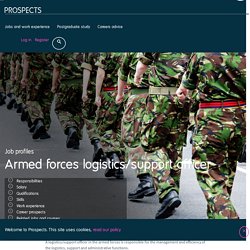
In the Army, they are known as staff and personnel support (SPS) officers, part of the Adjutant General's Corps (AGC), or specialist officers in the Royal Logistics Corps (RLC) , who are trained in supply, distribution or commodities (e.g. ammunition or petroleum). They are called logistics or supply officers in both the In each setting, their purpose is the same: to enable each service to carry out its allotted role in peace and war. Responsibilities. Armed forces operational officer job profile. Operational officers in the armed forces lead the fighting arms.
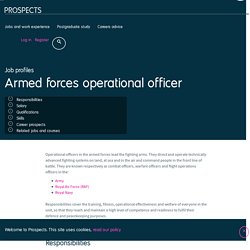
They direct and operate technically advanced fighting systems on land, at sea and in the air and command people in the front line of battle. They are known respectively as combat officers, warfare officers and flight operations officers in the: Responsibilities cover the training, fitness, operational effectiveness and welfare of everyone in the unit, so that they reach and maintain a high level of competence and readiness to fulfil their defence and peacekeeping purposes. The officer's primary responsibility in operations, which are often dangerous, fast-moving and chaotic, is to command, lead and inspire service personnel. Responsibilities. Armed forces technical officer job profile. A technical officer in the armed forces may be responsible, through his or her team, for the maintenance and serviceability of ships, aircraft and land vehicles as well as their associated weapons systems and support equipment.
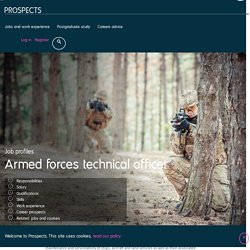
Technical officers may act as project managers on a base or construction site, or in research and the development of new equipment and systems. In battle, they have responsibility for keeping equipment, infrastructure and lines of communication operational. An officer must lead and manage a team of specialists, directing them when circumstances demand action and using their skills and competence. Responsibilities As a technical officer, your role will include not only management responsibility, but also a considerable extension of your technical experience to identify, investigate and solve problems.
Tasks often include: Salary Salary data from the Army, Royal Air Force (RAF) and Royal Navy. Employee benefits Working hours What to expect Qualifications. Armed forces training and education officer job profile. A training and education officer in the armed forces is a commissioned officer with management, educational and personnel duties, who is responsible for education and training support within one of the three armed services.
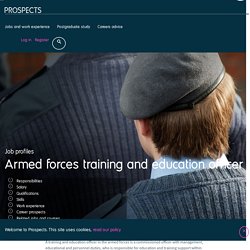
They're often responsible for specialist or technical training. As well as being a military officer whose role is to lead, motivate and manage, the work involves teaching and acting as a careers consultant and training adviser. Officers must also prepare their team, ensuring their readiness to fulfil their roles in the armed forces, directing them when circumstances demand action, and using their skills and competence. Responsibilities Training and education officers are often located at education and training centres within military bases, or cover a geographical area. There will also be occasions when they'll be required to fulfil field operational roles.
Duties typically involve: In addition, in field operations, activities might include: Salary What to expect. Armed forces officer: job description. What does an armed forces officer do?
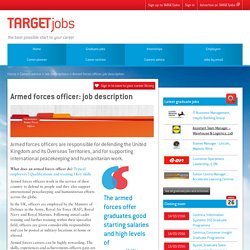
Typical employers | Qualifications and training | Key skills Armed forces officers work in the service of their country to defend its people and they also support international peacekeeping and humanitarian efforts across the globe. In the UK, officers are employed by the Ministry of Defence in the Army, Royal Air Force (RAF), Royal Navy and Royal Marines. Following initial cadet training and further training within their specialist field, officers are given considerable responsibility and can be posted at military locations at home or abroad. Armed forces careers can be highly rewarding. Responsibilities vary widely across the various job roles within each branch but typical activities include: Choosing to work within the armed forces is as much a lifestyle choice as a career move.
Army officer job information. Page Content Army officer HoursVariableStarting salary£16,000 + per year As an army officer you’re in charge of a team of soldiers.
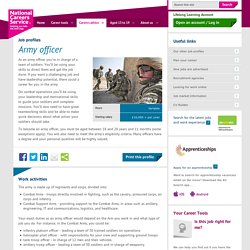
You’ll be using your skills to direct them and get the job done. Army – Officer Armed Services. Army officers lead and manage teams of soldiers.
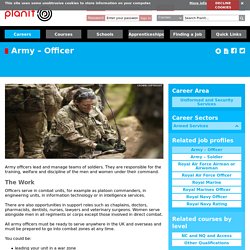
They are responsible for the training, welfare and discipline of the men and women under their command. The Work. RAF officer job information. Page Content RAF officer HoursVariableStarting salary£25,472 + per year The Royal Air Force (RAF) defends UK airspace.
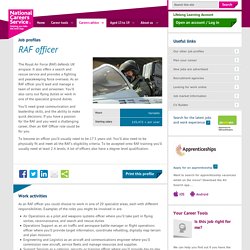
Royal Marines officer job information. Page Content Royal Marines officer HoursVariableStarting salary£25,472 + per year Royal Marines officers lead teams of commandos in combat situations, at sea and on land.
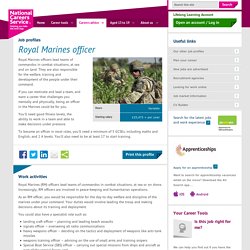
Royal Navy officer job information. Bomb disposal technician job information. Page Content Bomb disposal technician HoursVariableStarting salaryVariable As a bomb disposal technician you would identify dangerous explosive devices and defuse or destroy them to make them safe.
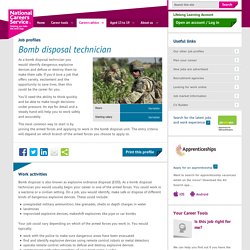
If you'd love a job that offers variety, excitement and the opportunity to save lives, then this could be the career for you. You’ll need the ability to think quickly and be able to make tough decisions under pressure. Lead First. Lead First is an intensive leadership development course, then spending up to a year gaining experience in a variety of junior officer roles with the Army. You'll be trained at Sandhurst and be awarded an Officer’s Commission in the Army Reserve. You'll then be responsible for leading and managing soldiers, whilst completing up to 12 months on a programme of varied activities and experiences. Think of it as your own graduate leadership training scheme, or a gap year with a difference. Or a taste of life in the Army, but with the responsibility and challenge that comes with being an Army officer.
The Lead First scheme is open to people with no previous Army Reserve service and those already serving in the Army Reserve, including those who have recently earned a commission in the Army Reserve. Join as an officer. What happens at officer selection? You will be invited to attend a two day Army Officer Selection Board briefing, where your leadership and teamwork skills will be tested. This will help you prepare for the Selection Board, which is a three-day assessment of both your physical and mental suitability for the role.
More advice on preparing for the Army Officer Selection Board (AOSB) How long is officer training? The course takes place at the Royal Military Academy Sandhurst and lasts 44 weeks for Regular officers, or three weeks for Reservists. After this initial training, you will go on a second course to learn specific skills related to your first appointment. College of Management and Technology — Defence Academy of the United Kingdom. Ministry of Defence. NATO - Homepage. Skills for Justice — Skills for Justice is the Sector Skills Council for Justice, Community Safety, Armed Forces and Legal Services. University Air Squadrons - Home. Yorkshire. University training. Fourteen P2000 Fast Inshore Patrol Craft form the First Patrol Boat Squadron. Their primary role is to support the University Royal Naval Units (URNU) but they also contribute to a wide range of Fleet tasking.
There are 14 URNUs located around the country offering opportunities to 700 undergraduates from the country’s leading universities in England, Scotland and Wales. The aim of the URNU is to broaden Naval understanding and develop undergraduates who show potential to become the leaders of tomorrow, through maritime experience and exposure to the values and ethos of the Royal Navy. Each URNU is commanded by a RN Lieutenant who is responsible for 51 undergraduates during their time in the Unit. It is not a recruiting organisation and membership of the URNU carries no obligation to join the Royal Navy on graduation.